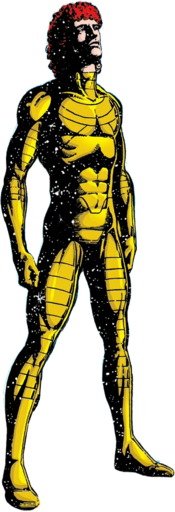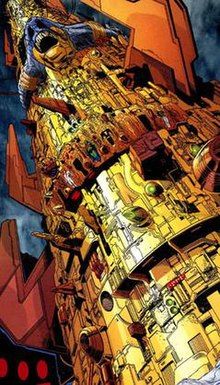Alexander Luthor Jr.
| Alexander Luthor Jr. | |
|---|---|
 Alexander Luthor Jr. featured in a portion of a panel from Crisis on Infinite Earths #3 (February 2006). Art by George Pérez. | |
| Publication information | |
| Publisher | DC Comics |
| First appearance | Crisis on Infinite Earths #1 March 31, 1985 |
| Created by | Marv Wolfman George Pérez Jerry Ordway |
| In-story information | |
| Full name | Alexander "Alex" Luthor Jr. |
| Species | Metahuman |
| Place of origin | Earth-Three |
| Team affiliations | Secret Society Black Lantern Corps |
| Notable aliases | Lex Luthor |
| Abilities | Genius-level intellect Ability to manipulate matter and anti-matter Ability to fire offensive energy bursts Ability to form and control dimensional portals |
Alexander Luthor Jr. is a fictional character appearing in comic books published by DC Comics. The son of Earth-Three's Lex Luthor, he played a large role in the Crisis on Infinite Earths and Infinite Crisis events.
Publication history
[edit]Created by Marv Wolfman and George Pérez, the character made his first appearance in Crisis on Infinite Earths #1 (April 1985). He had a prominent role in that series, and appeared 20 years later as one of the two primary antagonists of the sequel Infinite Crisis, alongside Superboy-Prime.
Fictional character biography
[edit]Crisis on Infinite Earths
[edit]Alexander Luthor Jr. is born on Earth-Three, the son of that world's Lex Luthor (known as Alexander Luthor) and Lois Lane-Luthor.[1] Luthor Sr. is Earth-Three's only hero, fighting the Crime Syndicate (an evil version of the Justice League of America). In Crisis on Infinite Earths, the Anti-Monitor destroys innumerable universes (including Earth-Three) with an anti-matter wave. To save their son, the Luthors place him in an experimental device which carries him to Earth-One.[2]
Alexander materializes on the abandoned satellite which was formerly headquarters of the Justice League. The Harbinger takes him in, at the request of the Monitor.[3] His passage through the anti-matter storm grants him power over both matter and anti-matter, dramatically accelerating his aging process. By the end of Crisis, Luthor is a young adult, despite the passage of only a few weeks.[4] After the Monitor's death, Alexander helps lead the heroes and villains of the DC Universe against the Anti-Monitor.[5][6] After defeating the Anti-Monitor (with the help of the Earth-Two Superman and Superboy-Prime), Alexander reveals that he has saved Kal-L's wife, the Earth-Two Lois Lane, from being erased from existence when the multiverse was destroyed. The foursome, no longer having a place in the Post-Crisis universe, retreat to another dimension which Alexander accesses with the last of his dimensional powers.[7]
Escape from "Heaven"
[edit]Infinite Crisis Secret Files reveals how the four survivors spent the years since the Crisis. The survivors have power over the dimension, and it reacts to their thoughts and emotions. Alexander becomes colder and more detached from the well-being of the universe's living beings, progressively becomes as corrupt as his father. While attempting to escape the paradise dimension, Superboy-Prime pounds on its barrier, creating "ripples" that alter reality.[8]
Superboy-Prime's efforts frustrate him; he is not as powerful in the post-Crisis heaven, because he has no yellow sun to power him. Alexander reveals that his own powers are returning, and the two combine forces to break through the barrier. Together, they set into motion the events that culminate in Infinite Crisis:
- Superboy-Prime pushes the planet Rann into Thanagar's orbit, destroying Thanagar's ecosystem, sparking the Rann-Thanagar War and shifting the center of the universe away from Oa.[9]
- Alexander poses as Lex Luthor and starts the new Society of Super-Villains.[10]
- Alexander recruits the Psycho-Pirate to place Eclipso's Black Diamond in Jean Loring's Arkham Asylum cell.[11] Loring, as Eclipso, seduces the Spectre into destroying magic, leading to the death of the wizard Shazam and the destruction of the Rock of Eternity.[12]
- Superboy-Prime destroys the Justice League Watchtower and abducts Martian Manhunter.[13]
Infinite Crisis
[edit]Countdown
[edit]Alexander watches the events on the post-Crisis Earth for several years with his companions, and eventually convinces a pessimistic Kal-L to break the walls of their paradise to intervene on post-Crisis Earth.[14] Alexander tells Kal-L and his cousin Power Girl that they can help him bring aspects of Earth-Two into predominance over the merged universes (since Earth-One had become predominant Post-Crisis), which will help Earth-Two's Lois Lane recover from her current illness.[15]

Lex Luthor does everything in his power to find his impersonator. Assuming the identity Mockingbird, he organizes the Secret Six. Lex eavesdrops on Alexander's transmissions for months, and finally confronts him in the Arctic. When Lex asks who he is, Alexander replies "I'm you. Only better." Alexander also reveals that his presence on Earth is what has been causing Lex' recent erratic behavior and interference to his thought processes. Lex is almost killed by Alexander and Superboy-Prime, but escapes by teleporting away.
Not only is Alexander masquerading as Lex Luthor, he is also using the Society to construct a dimensional "tuning fork". The structure incorporates heroes and villains from the Earths who combined to form the post-Crisis Earth, and the remains of the Anti-Monitor.[16]

The device requires a vast power source to operate, which Alexander generates by manipulating the Spectre into destroying magic. With sorcerers dead, the result is a raw form of magic that he device can tap into; this is personified by the power commanded by the wizard Shazam after his death. He needs lightning provided by one of Shazam's champions, Black Adam, who says the word due to influence from the Psycho-Pirate. Alexander programs the tower by granting sentience to Brother Eye, allowing the system to evolve into a brain capable of directing the tower's energies and mapping the multiverse to help him find the perfect Earth he seeks.[17]
With the device Alexander can divide the universe, re-creating the multiverse. He seems successful in recreating Earth-Two, but notes that this objective is not his ultimate one. With the parallel Earths restored Alexander combines various Earths, randomly bringing them together to observe the result and destroying the result if unsuitable. At the center of the universe, Donna Troy and her team see gigantic representations of Alexander's hands creating a rip in space.[18]
As Alexander attempts to combine Earth-Two and Earth-Three, Firestorm converts all the energy the heroes are firing at the rip into positive matter. Immediately after, Nightwing, Wonder Girl and Superboy arrive at the tower and free the captives. Superboy-Prime enters the fray; his fight with Conner destroys the tower, and the multiple Earths collapse into a single "New Earth".[19]
His plan foiled, Alexander decides that if he cannot create a perfect Earth, he will take this Earth by force and shape it as best he can. To that end, the Society meets in Metropolis to decimate the remaining heroes with Doomsday as their champion.[20]
Death
[edit]
After losing a battle (during which he seriously injures Nightwing with a blast which apparently drains his power), Alexander is held at gunpoint by Batman for severely injuring Nightwing and killing Superboy. Wonder Woman stops him, telling Batman that Alex is not worth it. Alex flees to Gotham City, where the Joker kills and mutilates him.[20][21]
Following his death, Alex returns on two occasions. He returns as a Black Lantern in Blackest Night and is temporarily resurrected by the Tangent Comics Green Lantern in Justice League of America (vol. 2).[22]
Powers and abilities
[edit]Alexander's greatest talent is his genius-level intellect which he uses to manipulate other characters, outwit his enemies and engineer the Multiverse Tower. The circumstances of his escape from the doomed Earth-Three give him power over matter and anti-matter, which he can use offensively as bursts of energy or to form and control dimensional portals. He also has a form of precognitive abilities, enabling him to foresee the most probable events. Overuse of his power seems to drain him; following his attempt to restore the Multiverse (and a subsequent attack on Nightwing) he was left apparently as vulnerable as a normal human, clearly terrified when Batman appeared to be about to shoot him, and eventually being killed by the Joker.
See also
[edit]- Superman (Kal-L)
- Superboy-Prime
- Crisis on Infinite Earths
- Infinite Crisis
- Lex Luthor (DC Extended Universe), who is depicted as the son of Lex Luthor Sr.
References
[edit]- ^ Greenberger, Robert; Pasko, Martin (2010). The Essential Superman Encyclopedia. Del Rey. pp. 218–219. ISBN 978-0-345-50108-0.
- ^ Crisis on Infinite Earths #1 (April 1985)
- ^ Crisis on Infinite Earths #2 (May 1985)
- ^ Crisis on Infinite Earths #3 (June 1985)
- ^ Crisis on Infinite Earths #5 (August 1985)
- ^ Crisis on Infinite Earths #9 (December 1985)
- ^ Crisis on Infinite Earths #12 (March 1986)
- ^ Infinite Crisis: Secret Files & Origins (April 2006)
- ^ Rann-Thanagar War (2005)
- ^ Villains United (2005)
- ^ Superman (vol. 2) #216 (May 2005)
- ^ Day of Vengeance (2005)
- ^ JLA #118 (September 2005)
- ^ Infinite Crisis #1 (December 2005)
- ^ Infinite Crisis #2 (January 2006)
- ^ Infinite Crisis #3 (February 2006)
- ^ Infinite Crisis #4 (March 2006)
- ^ Infinite Crisis #5 (April 2006)
- ^ Infinite Crisis #6 (May 2006)
- ^ a b Infinite Crisis #7 (June 2006)
- ^ "5.2 ABOUT 52 (with Stephen Wacker): Week 3". Newsarama. Archived from the original on June 23, 2007.
- ^
- Blackest Night #1 (July 2009)
- Blackest Night #3 (September 2009)
- Adventure Comics (vol. 2) #4 (November 2009)
- Adventure Comics (vol. 2) #5 (December 2009)
- Justice League of America (vol. 2) #50 (October 2010)
- Justice League of America (vol. 2) #53 (January 2011)
External links
[edit]- Characters created by George Pérez
- Characters created by Jerry Ordway
- Characters created by Marv Wolfman
- Comics characters introduced in 1985
- DC Comics characters who can teleport
- DC Comics male superheroes
- DC Comics male supervillains
- DC Comics metahumans
- DC Comics orphans
- Fictional characters with energy-manipulation abilities
- Fictional characters with elemental transmutation abilities
- Fictional characters with dimensional travel abilities
- Fictional characters with precognition
- Fictional characters with mental disorders
- Infinite Crisis
- Superman characters
